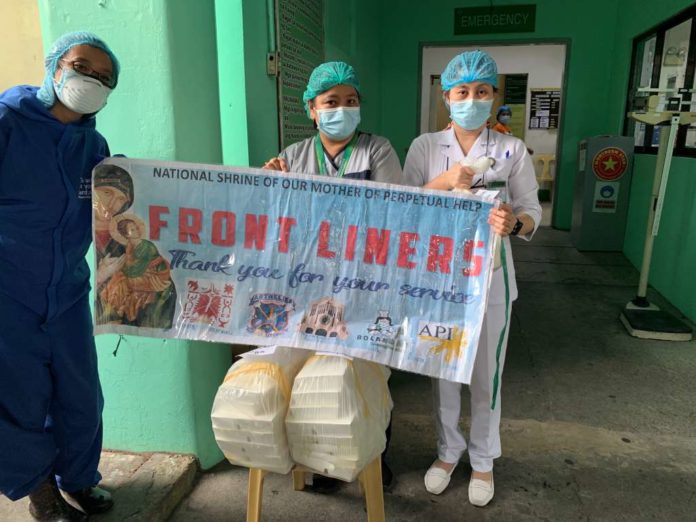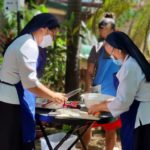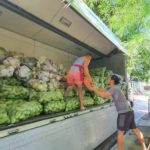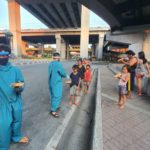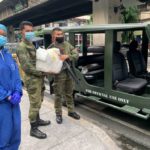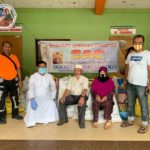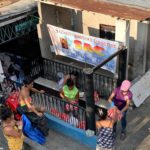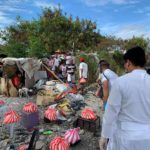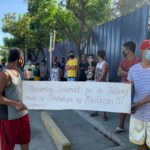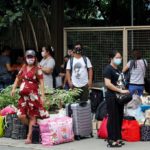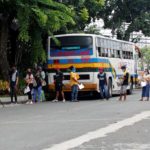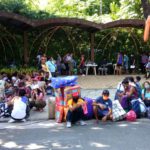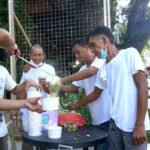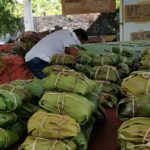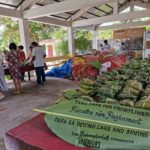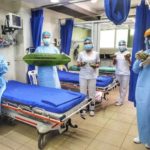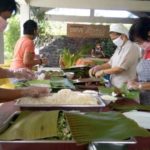The Philippines is one of the countries in South East Asia with the highest number of confirmed COVID-19 cases as of this writing — 70,764 and counting. It is also the country with the longest lockdown implemented since March 16, 2020, restricting movements of peoples except for essential activities. The strict lockdown has left the country’s economy on its knees, and of course, the poorest sectors, families, and individuals are the most affected.
In this difficult time, when anxiety, uncertainty and fear are creeping into the lives and minds of people, where do we situate our missionary presence? How do we direct our pastoral endeavors? When God’s people are restless due to the presence of an invisible villain that seems to haunt us down individually and as a community, what comfort could we ever give to ease the suffering of the faithful? More importantly, what is the Lord telling us as disciples of hope and witnesses of the Redeemer in a world wounded more than it already is?
These are some of the questions that the Vice-Province of Manila has to grapple with when the COVID-19 pandemic has escalated into a major health crisis in the country. And like the story of the early years of our congregation, we responded where the Lord calls. Or, at least we try.
Preach the Gospel at All Times; Use Food, It’s Necessary
When most of the provinces were put into lockdown and government and health institutions were scrambling to respond to an arguably unforeseen health crisis, the immediate concern that surfaced was food provision for medical frontline workers and food security for the vulnerable population. The medical frontline workers were in need of food assistance as they were overwhelmingly occupied attending to suspected and infected patients while restaurants, fast foods, and food stalls were closed. Vulnerable sectors, like the urban poor and the daily wage earners, have to find ways as well to put food on their tables and this has been made even more difficult when non-essential works and businesses were closed to mitigate the spread of the virus.
To respond to this pressing need, the communities of the Vice-Province mobilized its personnel and financial resources through the Permanent Commission on Social Mission Apostolate (PCSMA).
The Lipa community established its Mobile Kitchen serving meals for 6 hospitals in Batangas Province. The Baclaran community set up the Perpetual Help Kitchen providing meals for 7 hospitals and 1 COVID testing laboratory in Metro Manila. These two mobile kitchens prepare an average of 1000 meals a day. Following their lead, the Laoag community opened the St. Gerard Community Kitchen serving meals for the 2 frontline hospitals in Ilocos Norte. The Legazpi community has also put in place the DRIVE Mobile Community Kitchen for hospitals in the Bicol region providing medical care to COVID-19 patients.
Public safety officers and law enforcers manning checkpoints, government workers and volunteers, and other essential personnel were also recipients of hot meals. But as the community quarantine continued, the number of locally stranded individuals, Overseas Filipino Workers (OFWs), seafarers, homeless persons, and families has significantly surged urging us to respond to their plea for food as well. What was initially a community kitchen intended for the medical frontline workers has eventually expanded to cater to other sectors affected by the lockdown due to the pandemic.
From the first day when Lipa community launched the mobile kitchen initiative, a total of 163,169 meals have been served, broken down as follows: 48,376 food packs from Lipa; 101,462 from Baclaran; 3,331 from Laoag and more or less 10,000 from Legazpi.
Relief Packs for God’s Flock
Providing hot meals was a temporary relief to a hungry stomach. And since most of the wage earners of families in the low middle-class income bracket have no source of income due to the existing lockdown, providing for a week’s food supply is difficult if not impossible.
To address this concern, relief packs containing food aid and basic hygiene kit were also distributed to indigent families and individuals. Each pack containing rice, canned goods and other basic food items will lessen the family’s burden for at least three days or a week depending on the number of family members. Although the government’s social welfare arm has been giving financial and relief assistance, these were not enough. Many did not receive any because, for one reason or another, they were not on the list of beneficiaries.
Baclaran community through the Solidarity Assistance Committee (SAC) was able to distribute 5,119 relief packs to various impoverished communities, stranded workers and to one urban poor community that was reduced to ashes when a fire broke out leaving hundreds of families homeless amid lockdown. Lipa community through its Adapt a Family Program eased the burden of struggling families and distributed 1,913 relief packs coming from 61 communities. Legazpi community also gave away 1,086 relief packs to indigent families and jeepney drivers. Laoag community, through the Redemptorist Amianan Response Team (RART) also dispensed 856 relief packs to underserved sectors that were jobless during the pandemic — tricycle drivers, fisherfolks, farmers and stranded construction workers. All in all, the Vice-Province distributed 8,974 relief packs.
Aside from providing relief packs, there were other efforts to support indigent families and the struggling agricultural sector like establishing a make-shift market in our Divino Amor compound in Lipa City to assist the Cordillera and Benguet farmers while providing fresh and affordable fruit and vegetables to nearby communities, procurement and distribution of milk for 427 children in various barangays in Lipa, and facilitating distribution of donations in kind and in cash. Lipa community has also provided logistical support for distribution of medical equipment to 56 hospitals and rural health units of the provinces of Oriental and Occidental Mindoro, Batangas, Laguna, Quezon and some areas in Metro Manila.
Finding Refuge in the Home of Our Mother
The community quarantine has left individuals stranded and some homeless even. As there was no available public transportation, going home to provinces is almost impossible. Some people, out of desperation, opted to walk hundreds of kilometer just to be able to go out of the metro and be with their families. These people believe that life in the province is way manageable than staying in Metro Manila during this continuing pandemic. This situation has impelled us once again to respond and find ways to lighten the misery of these people.
In cooperation with the Office of the Vice President of the Philippines (OVP) and with the provincial offices where these locally stranded individuals (LSIs) are constituents of, we were able to facilitate their travel to their respective provinces. Baclaran Church served as the rendezvous point for buses and LSIs. To ensure that health protocols were observed, rapid COVID tests are being conducted before passengers are allowed to board the buses. Meals are also provided by the Perpetual Help Kitchen while our medical staff conducts the testing with assistance from the office of Brgy. Baclaran and with testing kits courtesy of private donors and organizations. Laoag community has also managed to assist in transporting stranded and jobless construction workers going back to their provinces. As of this writing, we have already assisted a total of 7,360 LSIs that are residents of Bicol region, Southern Tagalog, Visayas and as far as Mindanao.
Because of the strict implementation of lockdown with varying classifications in various provinces in the country, there are those who cannot travel yet. We have instead accommodated them in our shrines in Baclaran and Lipa while making the necessary travel arrangements. With the loving gaze of the icon of Our Mother of Perpetual Help enshrined in our churches, they have found temporary refuge in our Mother Mary’s home.
New Media Evangelization Towards a New Normal
Under normal circumstances, hundreds of thousands of devotees flock our churches and shrines especially on Wednesdays, the novena day to OMPH. The coronavirus lockdown, however, has prompted government authorities to suspend the public celebration of masses and other religious services. Even when lockdown protocols have been relaxed, the practice of communal worship was only allowed on a 10% capacity because sadly, as some church authorities opine, public celebration of worship is one of the least considered essential necessities by the government.
In a time when people are undergoing more emotional and spiritual stress, the more that the Church and her expressions of faith has to be made more visible. But how do we do that when circumstances restrict the dynamic and communal expression of faith?
To respond to this novel situation, live streaming of our shrine services were intensified. The already existing online platform for novena and masses both in Baclaran and Lipa has increased in its viewership challenging us to be more creative in utilizing multimedia and be more constant in our presence online. One expression of this is our effort to encourage devotees to express their prayers of thanksgiving and petition thru online submission in Facebook to which many have responded positively.
An evening interactive talk show in Baclaran dubbed “ICONnect” that run for more than a month during the height of the lockdown in Manila was a brilliant platform to interact with devotees online while delivering thematic discussions that are relevant to the faithful’s experience in the midst of a challenging situation. The feast day celebration of Our Mother of Perpetual Help last June 27 was a testament of an integrated physical and online celebration: limited attendance in our national shrine was complemented by a good number of attendees in the live streaming platform.
The Redemptorist Youth Mission program has also taken a different turn. We have taken the opportunity to engage our young people in social media. Because mass gatherings are not allowed in this time of lockdown, youth formation activities were held online while encouraging the young people to express their creativities as well through music and video production for the service of evangelization and mission to fellow young people. Closed group conferences were also held in an effort to journey with the young people in their share of struggles and difficulties amid the COVID-19 pandemic. But, of course, the downside is that not everyone has access to internet and social media.
Prophets Amidst Pandemic
The way the government is handling the COVID-19 pandemic has raised the eyebrows of many Filipinos. From a militaristic approach instead of a health crisis response to a lack of serious plans and misled priorities, Filipinos are left to fend for themselves. While coronavirus is wreaking havoc in the country, politicians in power are ravaging democracy and press freedom. The conviction of a journalist via a cyber-libel case, the non-renewal of the franchise of the biggest television network in the country and the passing of the Anti-Terrorism Law with seriously questionable provisions show how self-serving political decisions are being made, in the middle of a pandemic.
It is in this context that we were challenged to take on the Christian role as prophets in our age and time, in the middle of a pandemic. And so while we were busy responding to the needs of the poor and underserved, we also engaged ourselves in advocacies to protect and uphold values for good governance and public service. Calling out the government for lack of compassionate and competent response to the current crisis and participating in mass protests in social media and even within our church’s ground to express our dissent towards the ill-timed Anti-Terror Law are our ways of lending our prophetic voices to the voiceless in our society.
Collaboration for the Sake of Mission
All of these efforts are never done in isolation. God’s projects are only made possible because of generous people and like-minded organizations that have heard the cry of God’s people and have decided to share positive contributions in various capacities.
The relief efforts conducted and other assistance provided by all the Redemptorist communities in the Vice-Province were a product of collaboration with government offices, non-governmental organizations (NGOs), religious institutions, people’s organizations (POs) and even private individuals who in the midst of a challenging situation have chosen to step up to be of service to the poor and the most abandoned.
In a special way, we thank the Art Relief Mobile Kitchen (ARMK) for the inspiration and partnership in our mobile community kitchens, especially in Lipa and Baclaran. We are grateful to all the donors and devotees who continue to contribute to sustain our social mission programs. We also owe a debt of gratitude to the many volunteers and staff who went out of their way to deliver kindness and be in solidarity with the vulnerable sectors in this time of pandemic.
Truly, these people have made the Church truly alive by becoming bearers of Good News to others, better yet, by becoming the Good News themselves. Their passionate involvement in Redemptorist mission inspires us to be more faithful and persevering in our vocation as witnesses of the Redeemer, always in solidarity for the mission to a wounded world.
“Ut Unum Sint”
The battle against this pandemic is far from over. As our country continues to fight against COVID-19, we will carry on with our collective effort of kindness conscious of the fact that we are called to live out the Redemptorist charism today more than ever. We must be relentless in our efforts and must never waver in our desire to be in solidarity with the world shaken by fear, anxiety, indifference and doubt.
As Redemptorists, we must continue to find ways to be ever alive and relevant in today’s world, with or without the pandemic. Let us together believe and act on our faith that we can overcome this crisis together. We are all in this together, and no one, especially the poor, should ever be left behind. As Pope Francis emphatically mentioned in his address during the Extraordinary Urbi et Orbi blessing, “We have realized that we are on the same boat, all of us fragile and disoriented, but at the same time important and needed, all of us called to row together, each of us in need of comforting the other.”
Let us be reminded of the Thrust and Direction of the Vice-Province in this quadrennium. “May We All Be One” in carrying Christ’s light in the midst of darkness, in singing songs of hope amidst the lamentations of uncertainties, in sharing the Redeemer’s love to all.
May St. Alphonsus continue to inspire us to be witnesses of Christ’s redemption and may our Mother Mary intercede for us as we strive to be God’s perpetual help to the poor and the most abandoned.
Fr. Rico John Bilangel, C.Ss.R.



